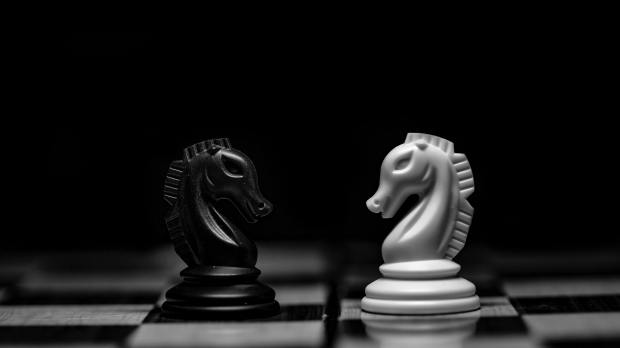Lenten Campaign 2025
This content is free of charge, as are all our articles.
Support us with a donation that is tax-deductible and enable us to continue to reach millions of readers.
Our house has become an island of misfit toys. The basement is crammed with forgotten old games, each with a few missing pieces. Upstairs, neglected dolls are shoved under the girls’ beds. The garage is a graveyard of deflated sports balls and the detritus of half-completed projects.
Occasionally, a child will re-discover an old forgotten toy and begin to play with it. Suddenly, every single child in the house needs to play with that specific toy, right away. Impromptu toddler speeches are composed and delivered to the holder-of-the-toy on the value of sharing and how turn-taking is a basic human right.
This phenomenon of the once-forgotten-but-suddenly-beloved toy is easily attributed to jealousy. I think there’s slightly more to it, though. It’s about winning. Whoever achieves control of the desired object is the winner. The losers either plot ways to become the winner, or the more sophisticated children will attempt to redefine the game entirely.
My daughter, for instance, will pretend she never wanted that doll anyway. The other doll is much better, anyway, and everyone knows that. The prize has been changed, and now both children with a doll will claim to be the winner, although neither truly believes it.
Status games
My friend David Zahl over at Mockingbird describes how we humans love to play status games;
“One’s neighborhood, taste in literature, number of dinner party invitations, advanced degrees, political views, body mass index, golf handicap, busy-ness. There’s the brand of shoes you wear, where your kids go to school, who gets to go on a private trip to space first — and, of course, who sees through status games the quickest.”
You see, status games aren’t only a problem for little children.
Consider suburban neighborhood streets in America where, every Saturday morning, the men come out of their houses armed to the teeth with lawn-maintenance equipment, prepared to do battle with their landscaping. They painstakingly shape the grass into a manicured field of green by cutting the grass perfectly level, edging the unruly blades back from the driveway, and carefully spraying fertilizer and then weed-killer. They check that the hedges are trimmed to look tidy and proper and that the automatic sprinkler system is working. Then they all go inside, often not glancing at the lawn again until the subsequent Saturday when it’s time to work on it again.
Much like the size and scope of the Christmas light display, door decorations for holidays, the sign in the front window proclaiming a moral belief about a hot topic, or the type of car parked in the drive — the tidiness of the lawn has become a status symbol.
Of course, many people love gardening and working in the lawn, or take genuine innocent delight in putting up kitschy Christmas lights and decorating for the holidays. My point isn’t that there’s a specific category of activities that are bad. My point is that we are capable of turning pretty much anything at all, good or bad, into a status game.
We want to win. We cheat at board games, brag about how much we volunteer at church, and how many sports teams our children are on. I know I’ve felt it even in relation to other priests, how we minister, how full our Masses are, how many people ask us to speak at events, and who likes us. I want to “win” the game of who the laity like most.
An unlikely model
When examining a vice that turns even the smallest things into a competition, it might be helpful to consider the life and example of St. Louis, King of France. What could be more tempting than to have all the power of a king and play status games in a major way?
A king, from almost any perspective, is the winner. He has the most fame, money, and power. The most toys, clothes, and vacations. He can lord his power over lesser nobles and commoners alike, rubbing their noses in his supreme status.
St. Louis did the opposite.
He was known to be a man of remarkable humility and peacefulness. He participated in the Mass frequently, reformed the justice system of France to make it more fair, sponsored the creation of hospitals, and was generally beloved as a king who didn’t lord his power over his subjects. He was a good father who taught his son to practice virtue and avoid sin. He pointed his son towards the value of cultivating a spiritual life and how loving God is more important than everything else.
St. Louis avoided status games. If I had to guess how he was able to do it, the answer is fairly simple.
Zahl points us in the right direction when he writes, “What makes status games so alluring? Well, in the simplest terms, everyone needs to feel like they’re worth something. We all ask the question: Do I matter? We ask it of our loved ones, and we ask it of society. We ask it of our bank accounts, and we ask it of our bosses. We need to know that we’re enough.”
We all want to know that we’re enough, that we have value. Status games are a way of trying to create value, but it never works because there’s always another game to be played, another opponent. Even Alexander the Great reputedly wept when he saw that there were no more worlds to conquer. He was master of a huge empire but was sad because it wasn’t enough.
St. Louis sought personal value in a completely different way. He understood that no victory in this world would satisfy, no matter the game. As he advises his son, “Fix your whole heart upon God, and love Him with all your strength, for without this no one can be saved or be of any worth.”
In other words, our value arises from the fact that God created us, loves us, and invites us to love Him in return. It’s a divine gift, not linked to status, freely dispensed, with no expectations. God has already helped all of us to win the game.



